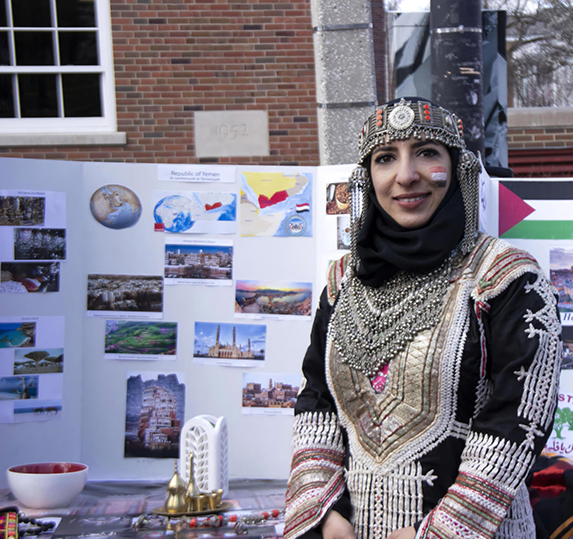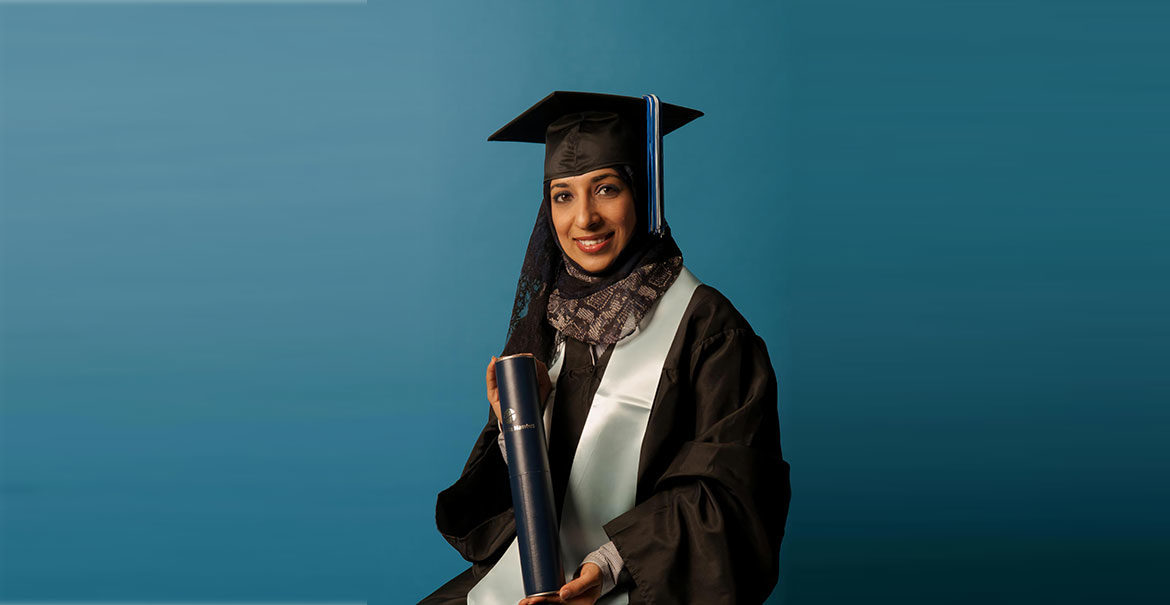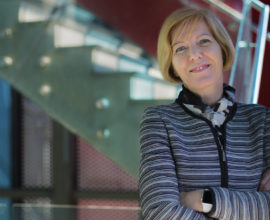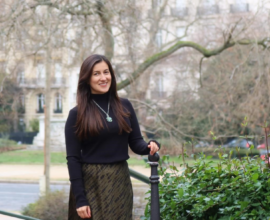Amal AbdulQader
A life story stranger than fiction
![]() Reading Time: 12 minutes
Reading Time: 12 minutes
MULTICULTURAL LIAISON OFFICER
Amal hesitated before agreeing to an interview for our iconic alumni series. “I wasn’t sure that my profile would be a good fit because my story is messy, with some ups, but also lots of downs.” She came on board when she realised that it would allow her to look back on her odyssey and document her journey to date. Amal’s itinerary has taken her from Yemen to Malaysia, the USA and now Canada where she new works for the immigration services organisation, which assists newcomers. Raised in conservative Yemen where girls were destined to marry early and become housewives, Amal’s career has been admirable; it is the desire to make a difference that has driven her from a young age.
Against all odds and facing objections raised by some of her relatives, Amal went into higher education thanks to prestigious “high potential” scholarships and came out with two master’s degrees. With a war-torn country as a backdrop, she studied for an MBA at Audencia, then returned home to hold a high-profile role in the (later aborted) peaceful political transition process, later being hired by the UN. Amal’s journey is a testament to her strength of character. We have grown accustomed to narratives where the selfless hero is rewarded with a happy ending. But Amal ended up in exile and recent years have proved bittersweet.
Amal’s life, like that of millions of other migrants, outstrips fiction. We are profoundly grateful to Amal for sharing it with us.
What is your family background?
I am the eldest of five siblings and was born and raised in Yemen. Both my parents were educated and open-minded, which was an exception to the norm in such a poor and traditionalist country. My mother had dreamt of becoming a businesswoman or economist. She married my father – then a student but later a financial General Manager – when she was still in high school. At the time, it was uncommon to see women in higher education, but my father supported her and she got a degree in economics and political science from the Faculty of Business and Trade. My mother was determined to work, even as a teacher, not just because she valued self-worth and independence, but also because she wanted to join forces with my father to provide us with a quality of life which included receiving a private school education.
What were you like as a child?
We lived with my extended family and I can still hear the laughter echoing through our compound. I was the eldest of 13 cousins, and I emerged as the natural leader of my pack. My grandfather and my father were very fond of me and proud of how mature I was. When I was nine, they started to confide their concerns to me, and to involve me in decisions affecting the family. From my childhood, I recall a feeling of freedom and innocence, as well as a sense of pride for contributing to the family’s important matters. I am grateful to have had the chance to grow in confidence and deal with responsibilities, as this helped prepare me for the hardship to come. I was 27 when my father died, and I naturally stepped in to support my family financially and emotionally.
Adolescence is an important transition for girls in Yemen as they are separated from boys. How did you live through this phase?
We used to be in mixed classes, school was fun, and I was a joyful and talkative child. My parents being open-minded, I had the privilege of being allowed to play with boys after school. But when I turned 12, I was made aware of how my body was changing, and suddenly I was considered a woman. Society expected us to “behave like ladies”, which included wearing the hijab, refraining from being loud or laughing demonstratively, and being assigned a “male guardian” who made decisions for us. I was prepared for this rite of passage, but I still took this attack on my way of life and freedom as a cruel injustice.
You wanted to become a doctor, … is it not a boys’ dream in Yemen?
Ever since I was a child, my nickname was “Doctor Amal”. I always achieved good grades and in Yemen, the royal road for high- performing students is to go into engineering or medicine. I wanted to become a doctor because I thought it would be the best way to help vulnerable people. And also, because the rebellious side of me was desperate to prove to everyone – and to myself, that I could succeed in a field that was traditionally a man’s prerogative!
My way of coping with how I was treated as a teenage girl was to turn in on myself and to focus entirely on my education. I became quiet, introverted, lonely … but it paid off.
When I finished high school, my parents received lots of marriage proposals. 17-18 is the peak age for marrying i.e., for getting protection and economic security. My mother supported me in my decision to finish university first, against the objections of some of my family members. My life could have taken a whole different turn if it hadn’t been for my mother, my father and my grandfather who understood and respected my decisions.
I worked extremely hard for the medical school’s entrance exam. My parents were so proud when I got a place; I specialised in pharmacy. My social life was poor as I was obsessed with succeeding academically and became competitive. I hid my femininity because I was not comfortable when people complimented my looks; I wanted people to notice my mind.
Once a qualified pharmacist, you made the brave decision to give your career a completely different turn. What was the trigger?
In my third year at uni, I attended a Youth Development Conference (YDC) organised by the Canadian-Yemeni Collaboration to empower young people to set goals, build self-confidence and network. Meeting some fascinating speakers and activists and interacting for the first time with people from abroad created a shift in my personality. The nerd that I had been for years had a lightbulb moment: I could be a dedicated scholar whilst connecting with people. The joyful and outgoing personality that I had as a child started bubbling up again and I came out of my shell. I started to volunteer for different NGOs and get involved in the community.
A couple of years later, I realised that working in the pharmaceutical industry was the wrong path for me. I wanted to work in a lab and invent new treatments to improve people’s lives but had ended up in a sales role instead, in which, as a woman, I struggled to be taken seriously by my clients at that time. More importantly, I didn’t feel I was adding any value. I accepted that just because I had studied hard for five years did not mean I had to stick with this career for the rest of my life.
Announcing to my parents that I was moving to the nonprofit sector was not easy, but they trusted my decision. I started coordinating health, education and human rights programmes, and was rapidly promoted to project manager: I had found my calling.

Why did you decide to join Audencia?
At 30, after 5 years in the field, I decided it was time to try to fulfil my dream of studying abroad and discovering the world (here I was applying in secret so no one could hold me back). Only a handful of prestigious scholarships are accessible to Yemeni students, one of which was for an MBA at Audencia, funded by Total. The selection procedure was tough, and the process was intense, especially as it took place in a tense political context. In 2011, all the main institutions shut across the country because of a popular uprising. So, Total had to send us to Cairo to take the GMAT test. I flew back home and the airports closed a day later. But I made it and was offered a place!
To be honest, France was not my first choice because I didn’t speak the language, I had no relatives there and I had heard rumours that the principles of secularism in France marginalised Muslim girls. But I knew that this was an opportunity worth seizing. I announced the news to my family whereas no one was even aware that I had applied. As I expected, objections started pouring in: “How are you going to travel? You need a male companion! You won’t be welcome there!” My mother was anxious, but her pride took over and she let me go.
You say that your experience at Audencia was “life changing”. Can you tell us why?
When I arrived in Nantes, I found myself completely on my own, which had not happened in a long time. Finding the right outfit was daunting. I was wearing abayas in Yemen, a full-length garment that only let my eyes show. I knew I had to find a compromise between a modern look that western people would accept, and a modest one in which I would feel comfortable. I had decided that if I was ever asked to take my hijab off, I would fly back home. Luckily, in private institutions, the rules on religious garments are more flexible than at public universities. Yet, exposing my face was a huge step; I felt naked for the first few months.
At first, I was anxious about some of the social norms, such as handshaking. Then, on observing my Japanese classmates bowing, it was comforting to realise that I was far from being the only one with different cultural habits. One day at the beginning of the year, we were joking around in the class and a girl from Asia told me that she had never realised that a Muslim girl could laugh and be friendly! Initially I was shocked and a little insulted, but we ended up forming a beautiful friendship and years later, I even stayed at her home in the USA. Our MBA class was truly international, and the staff at Audencia were always mindful of cultural considerations which, over time, helped me feel less awkward. We became each other’s second family and social network, and we all gained cultural understanding.
Yes, my time at Audencia was literally life-changing. I developed confidence and clarity as regards my career aspirations. I also let go of any preconceived ideas I had about western culture. I realised that I should stop seeing the world through the eyes of my community, or the media, and start applying my own filters.
What are your best memories from your time at the school?
Academically, I worked at merging my interests in community empowerment and social development with my newly acquired skills in business management. I discovered the concept of Corporate Social Responsibility and based my graduation project on it.
During school breaks, I had an amazing time with my classmates on various trips to Belgium, the Netherlands and Spain. Our travel style was so different from the Arabic way, which is all about comfort and safety. I had so many “firsts” on those trips: learning how to use a paper map! Travelling by train! Spending the night in a sleeping bag! Foodwise, I became increasingly adventurous: I tried sushi, and dare I admit it … even snails!
You have held prestigious roles in Yemen, tell us about them
I returned to Yemen just as an agreement was found to enter a peaceful phase of the National Dialogue Conference to prepare a new constitution. At that point, I was well known in the nonprofit sector and had an MBA from a respected business school in hand; I quickly obtained a role as head of the Community Participation Unit in the General Secretariat of the historical conference that took place from 2013 to 2014. Basically, I was in charge of giving voice to the voiceless in our society to promote the dialogue: women, youth and NGOs. It was the highest position I had ever held. The work of the General Secretariat was directly connected to the president of Yemen, and I dealt with the political leaders as well as the United Nations special envoy. It was also the most fulfilling post, as it was an opportunity to contribute to the new Yemen.
After that, the United Nations hired me to manage a communication platform that they had set up to allow independent groups to communicate, which was another highly rewarding role. Tragically, conflicts erupted which sounded the death-knell of the peaceful transition. At the end of the day, things were out of our hands.
Can you share with us the conditions in which you had to flee your country?
In 2015, the bombings intensified, and the conflict turned into a ruthless and traumatic war. I was determined to get my family out of the country. The UN invited me to attend a peace conference in Geneva, but no one except UN staff was allowed to board UN planes. Leaving my family behind was not an option for me and, with the Saudi coalition having bombed all the airports, I resorted to organising a risky bus trip to Oman for my mother, my siblings and I. From there, we flew to Malaysia – a country where Islam is the official religion and where I thought we would be safe.
We ended up staying for six frustrating months, with little or no visibility on how events were going to pan out, and our savings were gradually dwindling away. I had gone from holding a prominent UN role with exciting prospects to being stuck in exile.
One day, however, I received some unexpected news. I had been accepted on a master’s programme, in international development in the USA, that I had applied for the year before. The scholarship was only awarded to four participants and I was the only woman! I was stunned but also conflicted, in light of the unstable political situation at home. My mother eventually persuaded me to go. She reminded me of how hard I had worked to earn this scholarship. She told me: “The UN has put an end to your contract, so you have no reason to come back home. You have supported the family since the death of your father and your siblings are almost all grown up. Now is the time to think about your own future. Don’t miss this chance”. It was the first time my mother had expressed her appreciation so openly to me.
I flew to the USA to pursue my dream of enhancing my education, wracked with guilt, as my family returned to Yemen where their lives were going to be at risk. Still to this day, I often regret my decision, since it led to my not being able to see my family for five years.
Tell us about your experience of being a Yemeni woman in the USA under the Trump administration?
My plan was to complete my master’s at Ohio University, then return to Yemen and be in a stronger position to contribute to rebuilding my country. But the war still hadn’t ended; it still rages on today. There have been times when I’ve been desperate to go home, especially when my grandfather fell ill. However, my family has always categorically refused to allow it, arguing that millions of Yemenis are trapped in hell and that I should not compromise my own safety. Instead, I’ve tried to find ways of making myself useful by working and volunteering at the university to help international students adapt to the local life and American culture.
Then, the newly elected U.S. administration imposed restrictions on Yemeni citizens. If I were to leave the country, I would risk not being allowed back in, thereby losing my scholarship. I missed a job opportunity because of my nationality: the recruiter was concerned that the ban on Yemenis would make recruiting procedures too complicated. Yet the project consisted in helping Yemeni communities … and they recruited someone from Egypt! For me, this entire situation was both unstable and unpromising. After so many sacrifices, I felt unwelcome and stigmatised. I fell into depression and I knew I had to leave.
How did you end up making a new life for yourself in Canada?
I had a few relatives there. Moreover, the country has a “Yemenis Welcome” policy and recognises Yemeni citizens as victims of war, like Syrians. It had never been my plan to settle in Canada, but life does not always work out as one expects. I just had to accept my fate, and learn to live with the consequences of my choices. Back in 2013, I thought I was in such a great place, surrounded by my loved ones, good qualifications, my dream job and a network. I had to start all over again in a new community.
I now work as a multicultural liaison officer, helping refugees and professional migrants to settle and integrate. I assess their needs, guide them towards any relevant resources, help with translations, and educate them on cultural differences. This job makes me happy. Once again, I get to experience that rewarding feeling of making a difference. I have gradually built up a new social network, I go out, I try new sports, I travel… throughout Canada.
What is your biggest wish for the future?
My immediate goal is to try to bring my mother and siblings over here to Canada, which has now become my second home. My long-term plan is to help Yemeni people and to visit Yemen again one day. I know that it will take years because there is no solution in sight to the end of the conflict. It has become a hugely complicated geopolitical issue and currently constitutes the world’s largest humanitarian crisis. My younger brother is 12, and he too, just like all Yemenis, deserves better. My life is no more valuable than anyone else’s in Yemen, but I refuse to become just another number to add to the list of casualties.
My wish is to make my mark on the world, wherever I find myself. My purpose is to help those less privileged to get the decent life they deserve.
What are your daily coping mechanisms at overcoming despair and frustration?
My job brings me purpose and comfort. I keep in touch with my family and we cheer each other up. My philosophy is that nothing lasts forever, whether it is happiness, sadness, or hardship. I believe in karma and that better days will come. I also try to look back and appreciate the progress I have made: I arrived in this country feeling like a victim who had no plan and no control over her destiny. I now have a career, new friends and what’s more, I have allowed myself to dream again.
What are your plans for the weekend?
We have a bank holiday weekend coming up in Canada for Thanksgiving. After talking to you, I will jump straight into a Skype call with one of my ex-colleagues in Yemen. I love a good catch-up and it’s important for me to keep connected with my network back home. Then I’ll go for a long walk in the park, to absorb the vibrant colours of Canada in the fall. There’s nothing quite like it!



